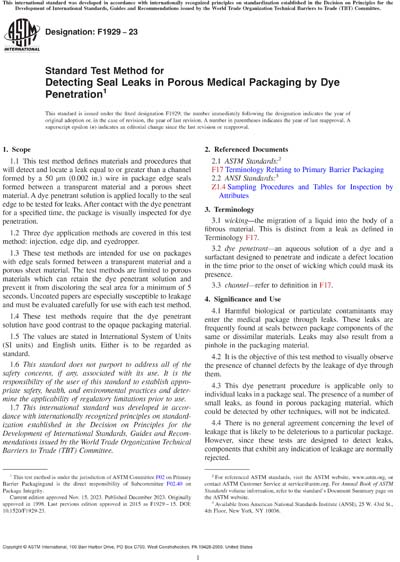Most recent
ASTM F1929-23
Standard Test Method for Detecting Seal Leaks in Porous Medical Packaging by Dye Penetration
1.1 This test method defines materials and procedures that will detect and locate a leak equal to or greater than a channel formed by a 50 µm (0.002 in.) wire in package edge seals formed between a transparent material and a porous sheet material. A dye penetrant solution is applied locally to the seal edge to be tested for leaks. After contact with the dye penetrant for a specified time, the package is visually inspected for dye penetration.
1.2 Three dye application methods are covered in this test method: injection, edge dip, and eyedropper.
1.3 These test methods are intended for use on packages with edge seals formed between a transparent material and a porous sheet material. The test methods are limited to porous materials which can retain the dye penetrant solution and prevent it from discoloring the seal area for a minimum of 5 seconds. Uncoated papers are especially susceptible to leakage and must be evaluated carefully for use with each test method.
1.4 These test methods require that the dye penetrant solution have good contrast to the opaque packaging material.
1.5 The values are stated in International System of Units (SI units) and English units. Either is to be regarded as standard.
1.6 This standard does not purport to address all of the safety concerns, if any, associated with its use. It is the responsibility of the user of this standard to establish appropriate safety and health practices and determine the applicability of regulatory limitations prior to use.
Content Provider
ASTM International [astm]






